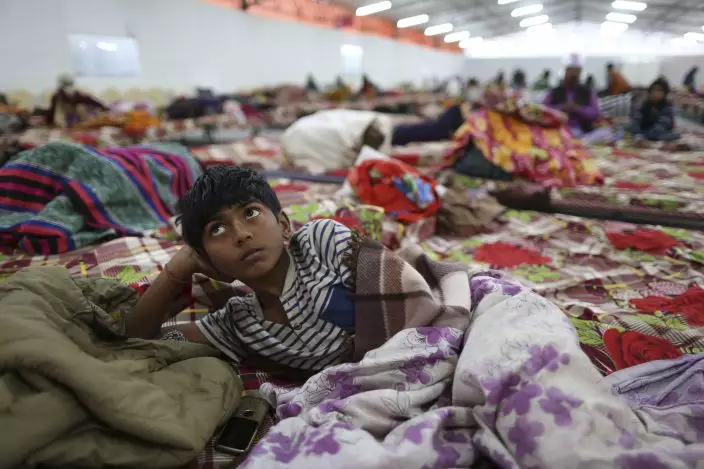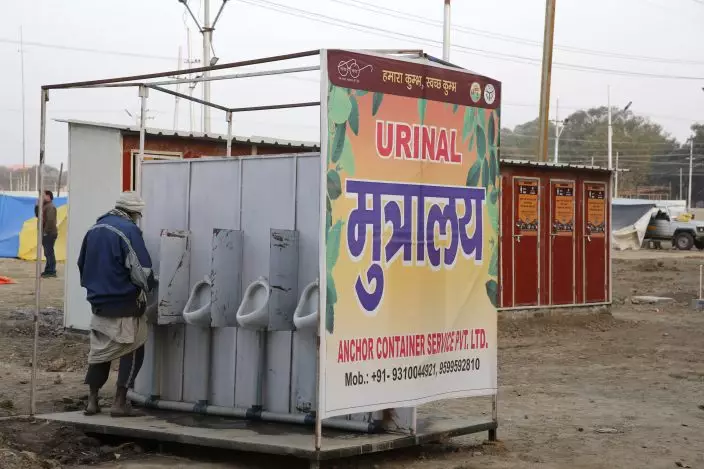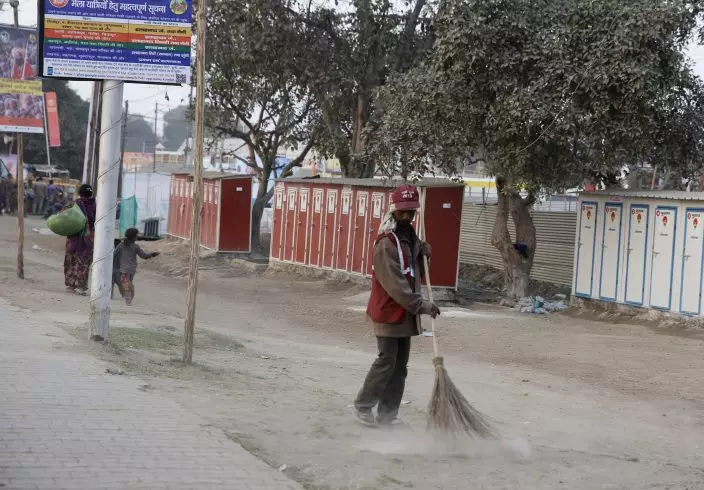Thousands of portable toilets line roads constantly swept clean, drinking water flows from newly installed taps, electric substations power a massive tent city and billboards encourage a "clean Kumbh," an extension of Indian Prime Minister Narendra Modi's huge push to improve sanitation across the country.
But the skies over the confluence of sacred rivers in northern India where millions of Hindu priests and pilgrims have come to wash away their sins at the ancient Kumbh Mela festival are thick with toxic dust, a sign that government officials are struggling to grapple with the country's worsening air pollution.
The hazardous air may also hinder the government's drive to make the Kumbh Mela, or pitcher festival, a global tourism event.

In this Monday, Jan. 14, 2019, photo, a boy rests in a makeshift night shelter for devotee at the tent city for the spiritual-cleansing Kumbh Festival in Prayagraj, India. The skies over the confluence of sacred rivers in north India where millions of Hindu priests and pilgrims have come to wash away their sins for the Kumbh Mela, or pitcher festival, that begins this week are thick with toxic dust, a sign that Indian government officials are struggling to grapple with India's worsening air pollution. (AP PhotoRajesh Kumar Singh)
Four sites in India rotate every three years hosting the Kumbh, the world's largest pilgrimage. The river baths, prayer, meditation and yoga sessions and other religious rituals are organized by sadhus, Hinduism's holy men, and financially supported with public funds.
Tens of millions throng to the sites for a holy dip, many with little money, few provisions and nowhere to sleep.
The Indian government has for years provided security and free food and shelter for the poorest pilgrims.

In this Monday, Jan. 14, 2019, photo, a devotee uses newly put up portable toilet at the tent city for the spiritual-cleansing Kumbh Festival in Prayagraj, India. The skies over the confluence of sacred rivers in north India where millions of Hindu priests and pilgrims have come to wash away their sins for the Kumbh Mela, or pitcher festival, that begins this week are thick with toxic dust, a sign that Indian government officials are struggling to grapple with India's worsening air pollution. (AP PhotoRajesh Kumar Singh)
For this year's Kumbh — though less religiously significant than the Kumbh that happens every 12 years, and still less than the one that occurs every 144 years — the government shelled out an estimated 4.3 billion rupees ($650 million), hoping to impress India's largely Hindu population ahead of general elections this year and draw visitors from around the world.
The budget supplied thousands of toilets and urinals, public dormitories, and hundreds of water stations, as well as police, hospitals, 24-hour pharmacies and fire and ambulance services.
And like elsewhere in India, a person's comfort is determined by wealth and social standing.

In this Monday, Jan. 14, 2019, photo, a municipal worker sweeps the street of newly set up tent city for the spiritual-cleansing Kumbh Festival in Prayagraj, India. The skies over the confluence of sacred rivers in north India where millions of Hindu priests and pilgrims have come to wash away their sins for the Kumbh Mela, or pitcher festival, that begins this week are thick with toxic dust, a sign that Indian government officials are struggling to grapple with India's worsening air pollution. (AP PhotoRajesh Kumar Singh)
The expansive campgrounds hosted everything from luxury "glamping" options that cost up to 35,000 rupees ($494) per night — private, tent "suites" with plush bedding and flush toilets — to a cot with a thin foam mattress in a public dormitory in a high-top tent that costs 200 rupees ($2.83) per night.
"I go to holy sites very often, but I'm used to them being very dirty. I have never seen this level of cleanliness measures at any other holy city," said Gita Mishra, 58, one of the guests at a public tent near the banks of the river.
When people waiting for a spot outside the tent learned it was full, they laid blankets around the periphery to sleep in the hazy open air.
Still others, including about 500 sanitation workers, pitched pup tents near a row of some of the toilets they are paid 300 rupees ($7) per day to clean.
The production of any Kumbh is a gargantuan task, particularly in the low-lying Indian army parade grounds in Prayagraj where the ritual baths take place. Regular summertime floods leave organizers only 40 to 50 days to erect the temporary city, according to city commissioner Ashish Goel.
But this year's public provisions are unprecedented.
"It's a very aspirational Kumbh Mela," Goel said.
The dust plumes encompassing the camp come from the sandy riverbanks, Goel said, and not from construction, which is banned during the 55-day festival. Still, in the city center outside of the fairgrounds, brick kilns send up clouds of PM 2.5, tiny particulate matter that can dangerously clog lungs.
India's cities are among the world's smoggiest.
The Indian government has announced a five-year program to cut air pollution by up to 30 percent from 2017 levels in the country's 102 worst-affected cities, including Prayagraj.
Key targets include reducing burning of field waste, firewood and charcoal, cleaning up thermal power and auto emissions and heavily polluting brick production and controlling dust from construction.
Critics say the plan lacks details on enforcement and funding.
Associated Press videojournalist Rishabh R. Jain contributed to this report.
Follow Emily Schmall at twitter.com/emilyschmall






